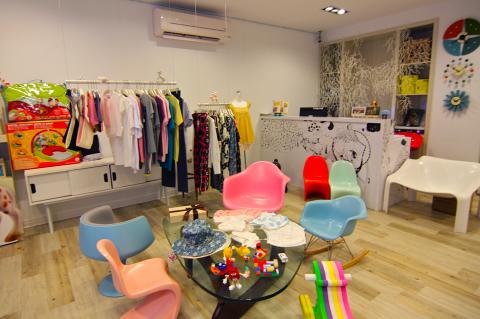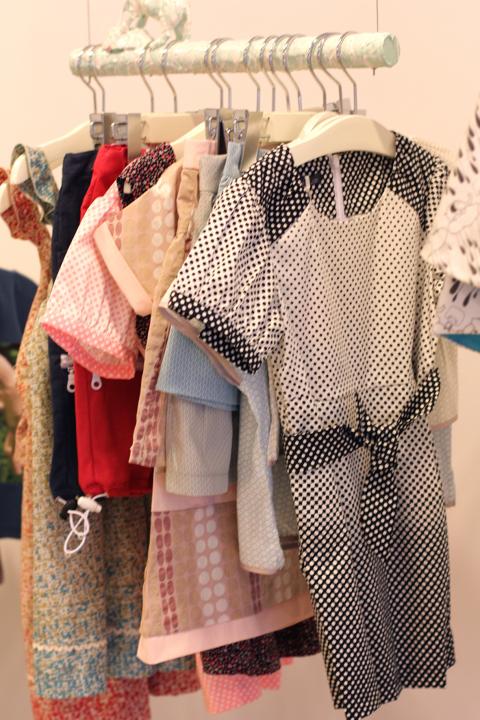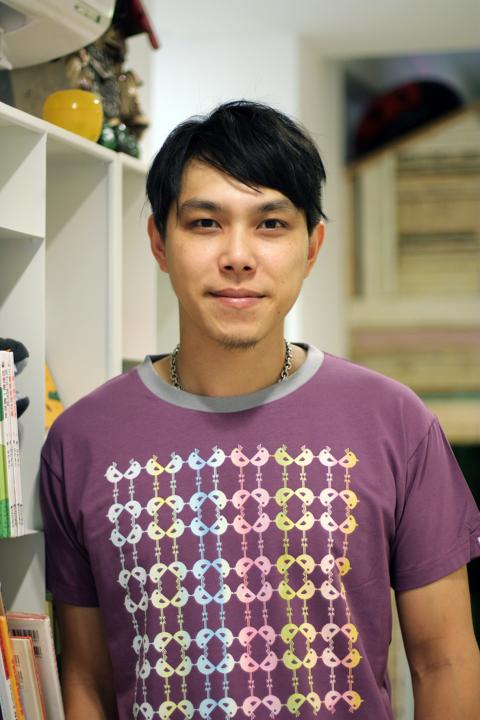New children’s clothing brand Litto Litto (小房子) seeks to appeal to style-conscious parents, with design inspiration drawn from vintage fashion and graphic prints. But Litto Litto isn’t just about looking stylish.
Owner Min Ho (何宗憫) wants families to see Litto Litto’s boutique, which opened in March on a lane off Anhe Road (安和路), as a place where they can spend an afternoon reading books and playing make-believe. (Litto Litto also recently opened a store in Taichung’s Eslite Park Lane mall (勤美誠品綠園道)).
The store contains lots of little touches designed to appeal to youngsters, including baskets of building blocks and toy animals and child-sized furniture. The cashier counter is covered with playful illustrations by Ho, and one wall of the store is lined with a small library of children’s picture books, some of which Ho reads during story-telling hours every Wednesday and Saturday.

The little touch that gets the most attention from kids, however, isn’t so little at all. It’s a big wooden playhouse at the back of the store. Instead of being filled with miniature furniture, the inside is decorated to look like a small forest, with plush green carpeting and walls covered with a mural made from photos taken on Yangmingshan. A large pink hippopotamus stuffed toy sits in a corner, waiting to be climbed on, and a round white cabinet is filled with yet more toys.
“A lot of children’s stories talk about a little house in the forest, but we wanted to flip it around and make a forest in a little house,” says Ho. The Litto Litto design team used recycled wood boards to cover the outside walls of the playhouse; the result is a homey patchwork of faded pastel colors, with a tiny door on one side.
“Kids like having something that is so small only they can fit through it,” says Ho.

PHOTO: CATHERINE SHU, TAIPEI TIMES, AND COURTESY OF LITTO LITTO
Ho’s ability to see the world through a child’s point of view was cultivated at university, where he taught children’s art classes while studying metalworking. After graduating, Ho continued teaching while working as a children’s tour guide at the Taipei Fine Arts Museum (台北市立美術館), a job he held for nine years.
Ho is now a design entrepreneur whose ventures also include a hostel in Kenting that will open next year and Casa Furniture (+俱), which specializes in modernist-style home furnishings. Last year, he started working with fashion designer Chigo Liao (廖竟淇) on Litto Litto.
Manufactured in Taipei City, Litto Litto’s clothing is made to appeal to parents and kids who don’t like the fussy details often found in children’s wear. Its clothing is winsome, but silhouettes are simple and crisp. Many of the designs have coordinating adult versions in the same fabrics.

PHOTO: CATHERINE SHU, TAIPEI TIMES
Litto Litto’s spring-summer collection was inspired by styles worn in 1960s and 1970s Taiwan. Items include shift dresses that cinch at the waist with a matching fabric belt, khaki trousers and short-sleeved button-down shirts with piping trim. The upcoming fall-winter line uses prints with geometric shapes and bold colors reminiscent of Op art. The brand stays away from gender-specific colors, such as pink for girls or blue for boys. Girls’ dresses come in black and white fabrics and a boys’ shirt is sewn from a light pink print on a white background. Designs also have grown-up details that are modified for active kids, including a high collar on a winter vest that can be flipped open and securely buttoned down.
“We want to make sophisticated clothing that is still suitable for kids, because we don’t like children’s clothing that is too cutesy,” says Ho. “We pay attention to trends, but we don’t follow them slavishly.”
Litto Litto also carries a selection of imported items, including American soft-soled Pediped shoes, Tessell play mats from South Korea and Sophie the Giraffe toys from France.
Before deciding to focus on clothing, Ho considered opening a children’s bookstore, and he wants to keep that atmosphere in Litto Litto.
In addition to Ho’s twice-a-week story hours, Litto Litto also hosts literary events for kids. Children’s author and illustrator Chen Chih-yuan (陳致元) came two weeks ago to read Guji Guji, his best-selling book about a crocodile raised by ducks. Volumes about dinosaurs are also popular among Litto Litto’s little literati, says Ho, as well as Japanese author Komako Sakai’s Mad at Mommy.
“I don’t want to have an atmosphere where everything is very attractive, but if you just browse and don’t buy anything, you feel awkward,” says Ho. “I want a space where parents can play with their kids, read books and feel like they’ve spent quality time together.”

“Why does Taiwan identity decline?”a group of researchers lead by University of Nevada political scientist Austin Wang (王宏恩) asked in a recent paper. After all, it is not difficult to explain the rise in Taiwanese identity after the early 1990s. But no model predicted its decline during the 2016-2018 period, they say. After testing various alternative explanations, Wang et al argue that the fall-off in Taiwanese identity during that period is related to voter hedging based on the performance of the Democratic Progressive Party (DPP). Since the DPP is perceived as the guardian of Taiwan identity, when it performs well,

The Taiwan People’s Party (TPP) on May 18 held a rally in Taichung to mark the anniversary of President William Lai’s (賴清德) inauguration on May 20. The title of the rally could be loosely translated to “May 18 recall fraudulent goods” (518退貨ㄌㄨㄚˋ!). Unlike in English, where the terms are the same, “recall” (退貨) in this context refers to product recalls due to damaged, defective or fraudulent merchandise, not the political recalls (罷免) currently dominating the headlines. I attended the rally to determine if the impression was correct that the TPP under party Chairman Huang Kuo-Chang (黃國昌) had little of a

At Computex 2025, Nvidia CEO Jensen Huang (黃仁勳) urged the government to subsidize AI. “All schools in Taiwan must integrate AI into their curricula,” he declared. A few months earlier, he said, “If I were a student today, I’d immediately start using tools like ChatGPT, Gemini Pro and Grok to learn, write and accelerate my thinking.” Huang sees the AI-bullet train leaving the station. And as one of its drivers, he’s worried about youth not getting on board — bad for their careers, and bad for his workforce. As a semiconductor supply-chain powerhouse and AI hub wannabe, Taiwan is seeing

Jade Mountain (玉山) — Taiwan’s highest peak — is the ultimate goal for those attempting a through-hike of the Mountains to Sea National Greenway (山海圳國家綠道), and that’s precisely where we’re headed in this final installment of a quartet of articles covering the Greenway. Picking up the trail at the Tsou tribal villages of Dabang and Tefuye, it’s worth stocking up on provisions before setting off, since — aside from the scant offerings available on the mountain’s Dongpu Lodge (東埔山莊) and Paiyun Lodge’s (排雲山莊) meal service — there’s nowhere to get food from here on out. TEFUYE HISTORIC TRAIL The journey recommences with